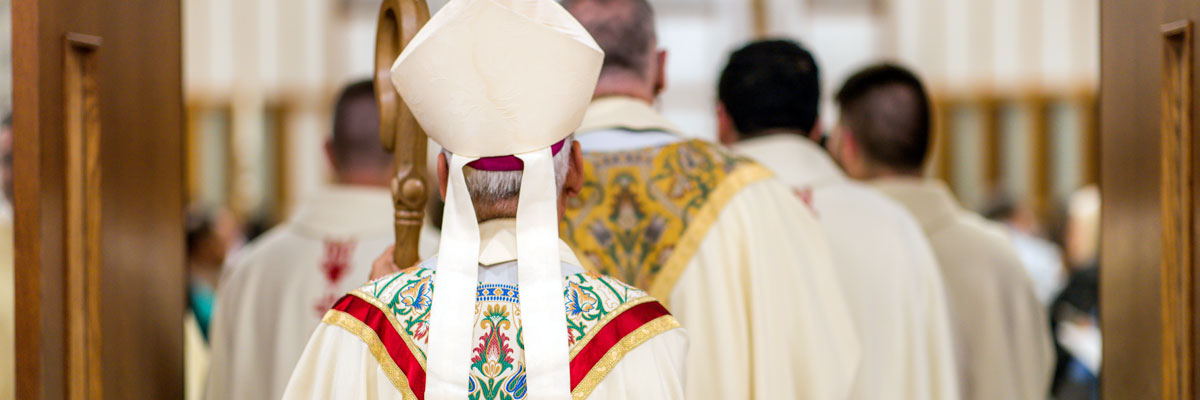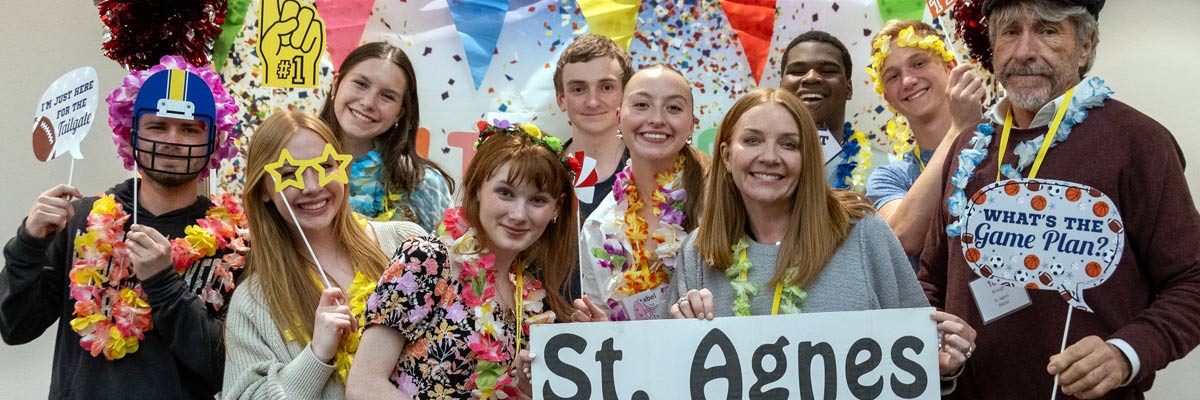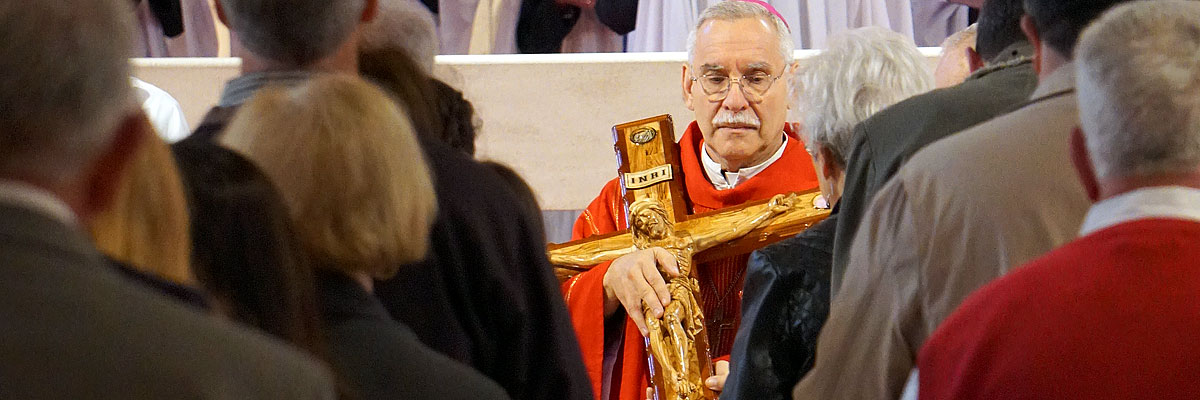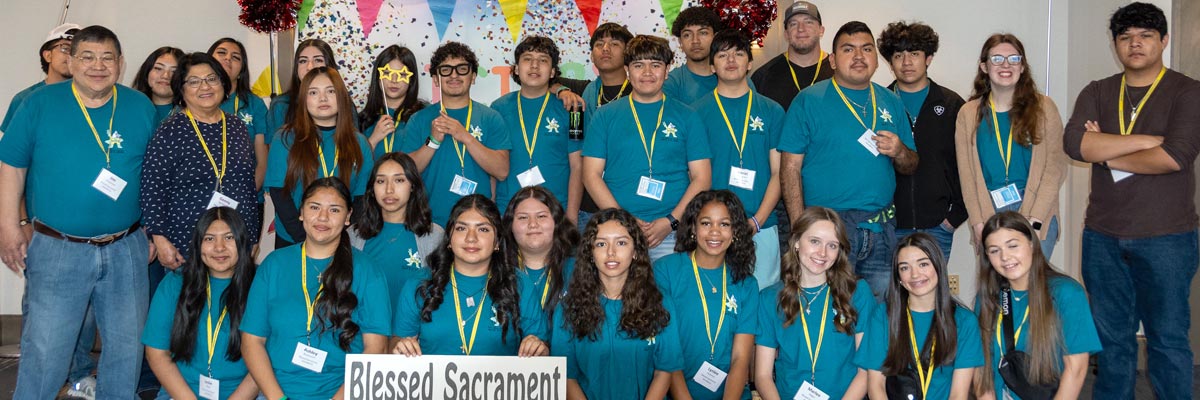Official Website of the
Catholic Diocese of Little Rock
25th Anniversary of Diaconate Class of 1998
Published: June 1, 2023
Bishop Anthony B. Taylor preached the following homily at the Cathedral of St. Andrew in Little Rock on Thursday, June 1, 2023.

Bishop Taylor
About 225 B.C., a Greek king gave a jeweler some gold and told him to make him a pure gold crown. But when he delivered the crown, the king suspected the jeweler had pocketed some of the gold and alloyed in the same weight of some other metal to hide his theft. So he asked the mathematician Archimedes: "Other than melting it down and destroying it, how can you tell whether a crown is pure gold or not?"
Archimedes deduced that since gold is the heaviest metal, the same weight of gold has less volume than the same weight of an alloy, but how to measure the volume of a complex shape, like that crown? Then one day as Archimedes took a bath, he saw what he had seen without seeing 1,000 times before: The water level in the tub rose as it was displaced by the volume of a complex shape — his body.
He was so excited by his discovery that he completely forgot himself and ran straight from the tub into the street naked shouting "Eureka! I've found it!"
Each person must convert and conversion is personal and dynamic, a change in your own self that leads to insight and thus forward motion. Another way of saying this is to remember that we are all born blind like Bartimaeus, and like Archimedes, even with physical eyesight we can see things thousands of times without really seeing them and then one day, Eureka!
In today's Gospel Bartimaeus made an even more exciting discovery and even managed to keep his clothes on. But unlike Archimedes, who people humored because he was rich, famous and important, Bartimaeus was a poor, unknown, worthless beggar and so people tried to shut him up when he shouted out his insight.
He shouted: "Son of David," one of the titles of the long awaited Messiah. But the more they tried to shut him up, the more he kept shouting out his insight that Jesus was the Messiah and his request ("have pity on me"). Bartimaeus had the insight that Jesus was the Messiah and that as the Messiah he could heal him.
If he didn't have that inner vision we call faith, he. as a professional beggar, would never have thought to ask for healing instead of a handout. And then in response to his faith, Jesus said: "Go your way, your faith has saved you. Immediately Bartimaeus received his sight and" since this new-found faith meant that Jesus' way had become his way, "he followed him on the way." Not only does Bartimaeus now have eyesight to see where he's going, he also has insight, the faith, to know which path to choose.
When early Christians described the Church, they called it simply "The Way" — as we see several times in the New Testament itself. Christianity is the way, a dynamic path to follow, a movement, people going somewhere, following Jesus on the way. I often remind people that God has no grandchildren, only children. You can't just passively inherit the faith.
Rather, each person must convert and conversion is personal and dynamic, a change in your own self that leads to insight and thus forward motion. Another way of saying this is to remember that we are all born blind like Bartimaeus, and like Archimedes, even with physical eyesight we can see things thousands of times without really seeing them and then one day, Eureka!
Something happens to open our eyes: the birth of a child, a near brush with death, the shock of realizing the gravity of some sin we committed or almost committed — moments of self-discovery when our eyes were opened and we saw clearly the disastrous direction our life was headed, moments of insight when God showed us a new path to follow.
Bartimaeus is far more than just one poor, blind beggar who lived 2,000 years ago, he's all of us. We too were once blind and we too have had our eyes opened by Jesus, and like Bartimaeus, in every Mass we too profess our insight that Jesus is our Savior and then come before him with our requests for forgiveness, for healing, for ourselves, our loved ones, our Church, our world.
Like Bartimaeus, we ask Jesus to "take pity on us." We say "Lord have mercy, Christ have mercy, Lord have mercy." We say "Lord hear our prayer." And like the Roman Centurion in another of Jesus' healing encounters, we say "Lord I am not worthy to receive you but only say the word and I will be healed."
And so to us also Jesus says in every Mass the very same words he said 2,000 years ago to Bartimaeus: "Go your way, your faith has saved you." And so then we are sent forth by Jesus from every Mass to love and serve the Lord — and like Bartimaeus, and like St. Justin Martyr whose feast we celebrate today — to follow Jesus on the way.









